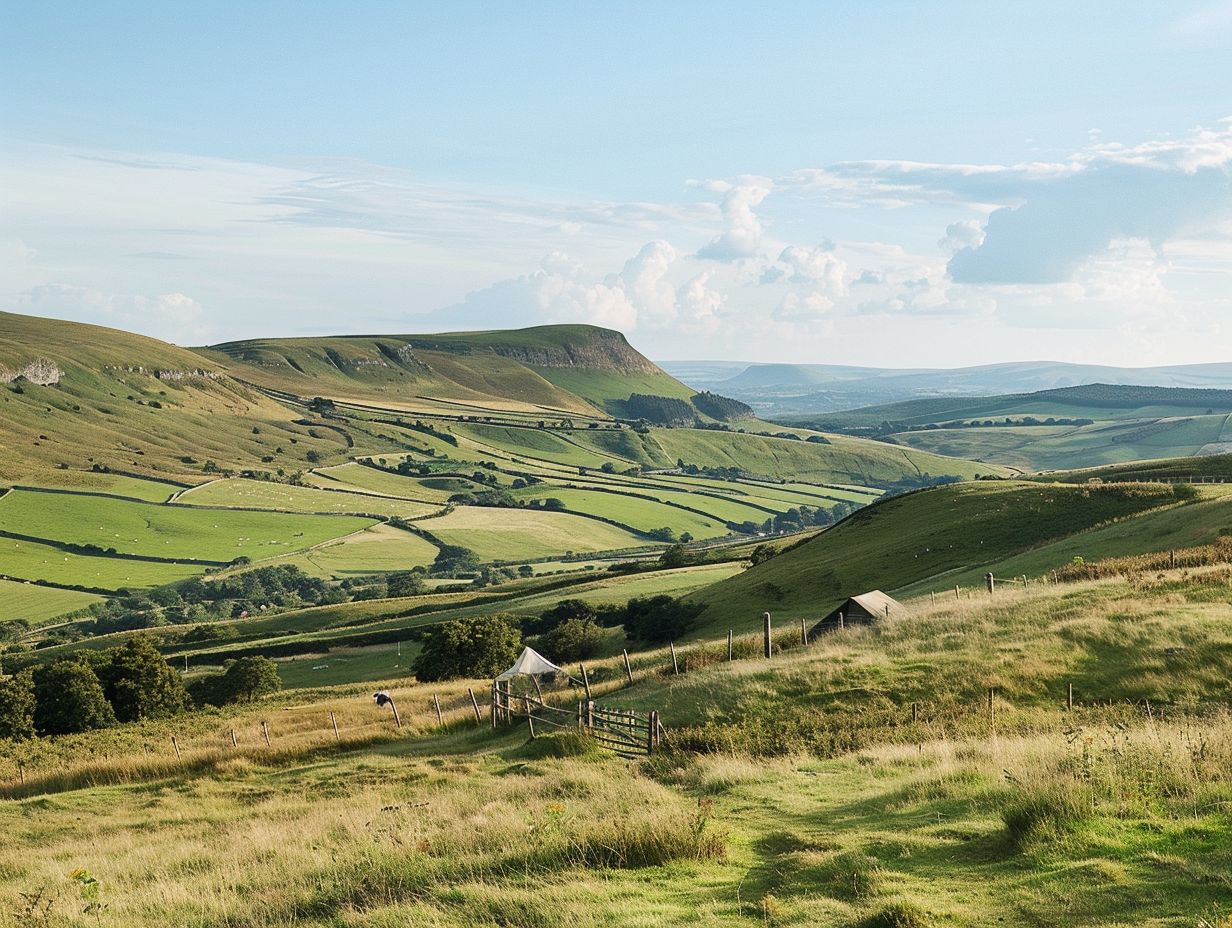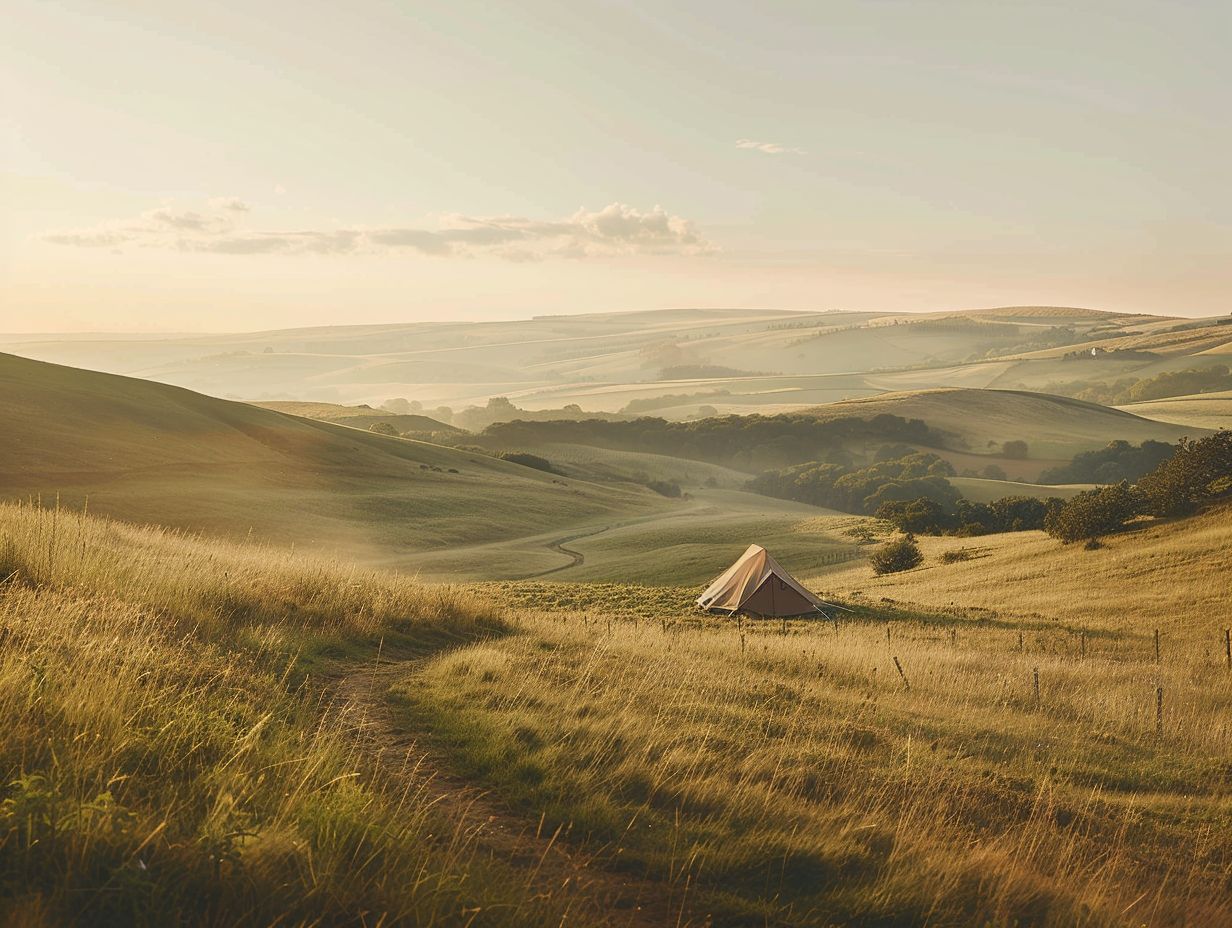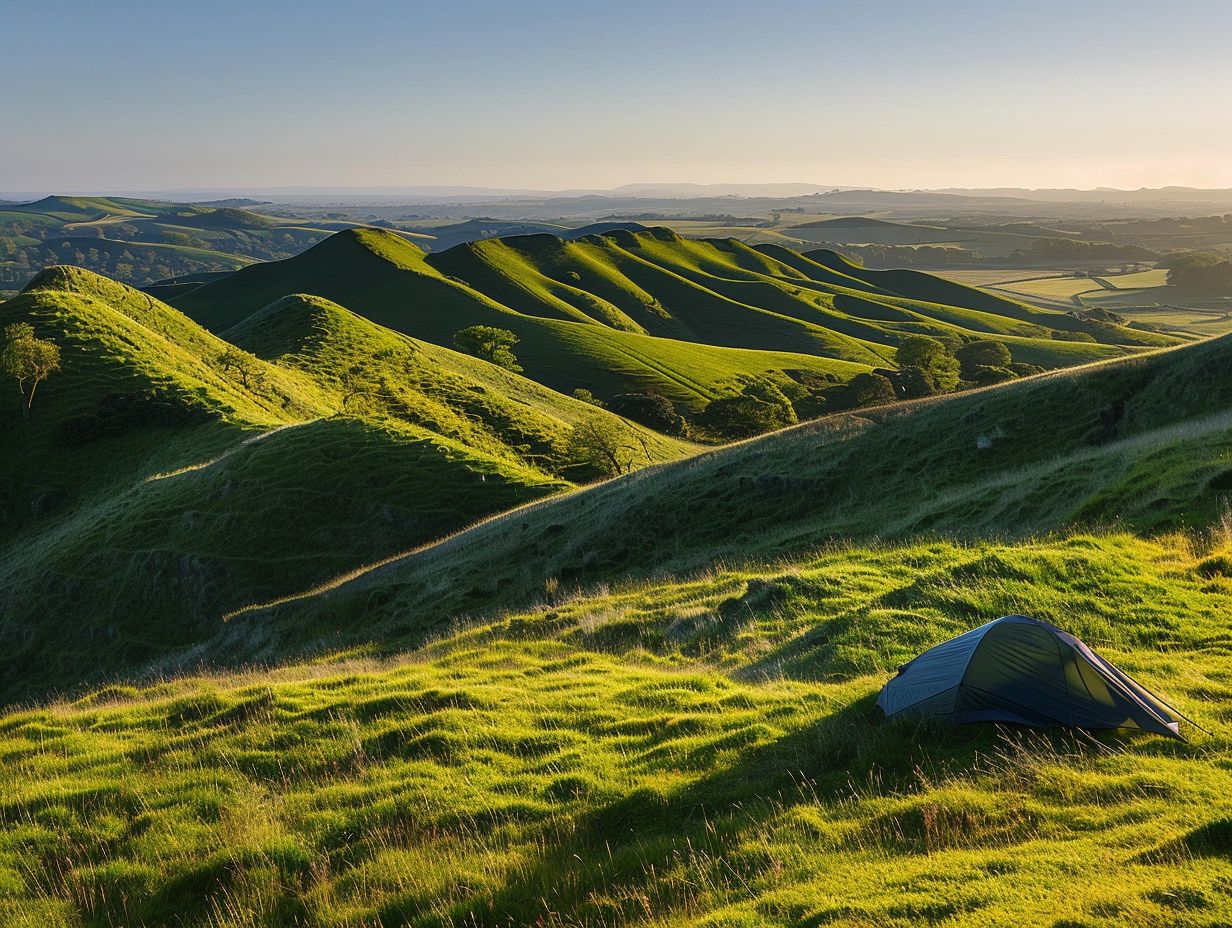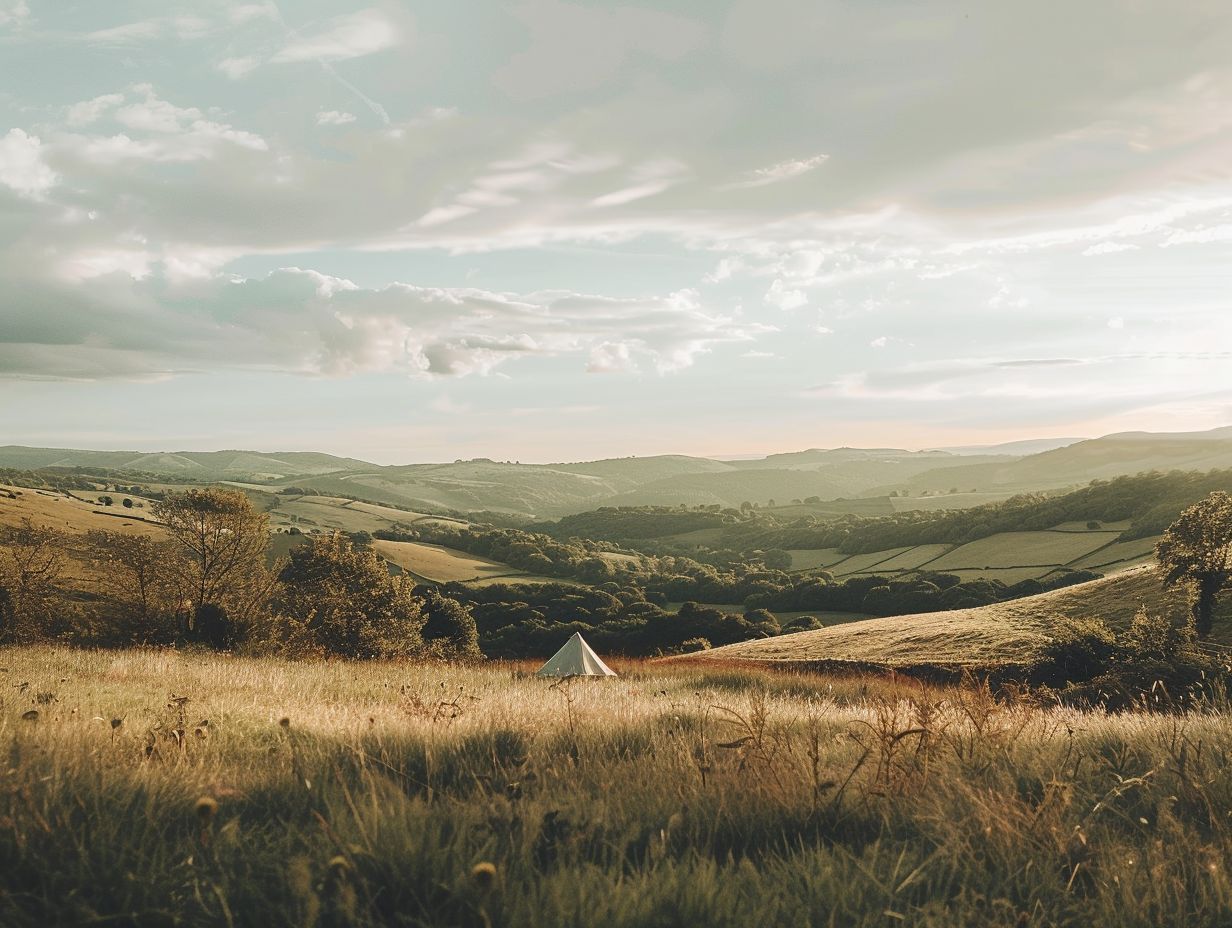If you are eager to escape the hustle and bustle of city life and fully immerse yourself in the beauty of nature, backcountry camping could be the adventure you are seeking.
In this comprehensive guide to backcountry camping in Britain, all the essential information needed to plan a successful trip will be covered. From legal considerations and necessary gear to safety precautions and enjoyable activities, all aspects will be addressed.
Therefore, grasp your tent, prepare your belongings, and prepare for an exceptional outdoor experience!
Key Takeaways:

- Backcountry camping in Britain offers a unique and adventurous experience for nature enthusiasts.
- When planning a backcountry camping trip, it is important to research and adhere to legal regulations and safety measures.
- The right gear and preparation can make all the difference for a successful and enjoyable backcountry camping experience in Britain.
1. What Is Backcountry Camping?
Backcountry camping, also referred to as wild camping, involves the establishment of temporary campsites in remote natural areas, away from established campgrounds or facilities. This allows you to fully immerse yourself in the beauty and solitude of nature.
This type of camping provides a more rugged and off-the-grid experience compared to traditional camping, where you are often in closer proximity to amenities and other campers. Enthusiasts of backcountry camping are attracted to the challenge of self-sufficiency, as well as the opportunity to completely disconnect from the hustle and bustle of daily life.
The allure of this type of camping lies in the ability to explore untouched wilderness, establish a deeper connection with the environment, and appreciate the simplicity of living with only the essentials.
2. Legal Considerations for Backcountry Camping in Britain
When engaging in backcountry camping in Britain, you must be aware of the legal frameworks that govern such activities, particularly in regions like Scotland where the Land Reform (Scotland) Act 2003 grants specific access rights for camping and outdoor recreation.
These rights, established in legislation, are designed to find a balance between public access and the interests of landowners.
It is crucial for campers to recognize that while wild camping is allowed in certain areas, there are precise guidelines to follow in order to protect the environment and uphold the rights of landowners.
Adhering to these regulations not only ensures a harmonious relationship between campers and local residents but also safeguards the beauty of the natural landscapes for future generations to enjoy.
By respecting designated camping zones and practising leave-no-trace principles, campers can contribute to the conservation of the wilderness while immersing themselves in the rugged beauty of Britain’s backcountry.
3. Essential Gear for Backcountry Camping
When planning for a successful backcountry camping trip, ensure you have the appropriate gear. Equip yourself with a reliable tent from reputable brands like Alpkit, MSR, or Hilleberg to guarantee comfort and safety while outdoors.
Invest in a high-quality sleeping bag from manufacturers such as Big Agnes, Western Mountaineering, or Marmot to stay warm and cosy during cold nights. Utilise cooking equipment such as camp stoves from Jetboil or MSR to prepare hot meals while camping.
Ensure you have navigation tools like a reliable compass from Suunto or Garmin GPS devices to orient yourself in the wilderness and maintain the right course throughout your journey.
4. Choosing the Right Location for Backcountry Camping
When planning a backcountry camping trip, it is essential to carefully select a suitable location. In Scotland, destinations like the Isle of Mull or Cairngorms National Park offer a wide range of landscapes and outdoor experiences for campers.
Factors such as terrain features, accessibility, and proximity to water sources should be taken into consideration when choosing a backcountry camping spot.
The rugged mountains of the Cairngorms National Park present opportunities for challenging hikes and stunning vistas, while the Isle of Mull features picturesque coastal cliffs and serene beaches for a more relaxed camping experience.
Being mindful of these elements can enrich your camping adventure and guarantee a memorable stay in Scotland’s breathtaking wilderness.
5. Planning and Preparing for Your Trip

For a safe and enjoyable wild camping adventure, effective planning and preparation are essential. To ensure a smooth trip, it is important for you to understand the rules and regulations of the area you will be camping in, consider weather conditions, and heed useful tips.
Begin by researching the specific regulations for the wild camping location you have chosen. This includes obtaining any necessary permits and understanding any camping restrictions that may apply.
Before setting off on your journey, it is crucial to check weather forecasts so that you can pack appropriate clothing and gear for the conditions you may face.
When packing for your wild camping trip, be sure to prioritise essentials such as a suitable tent, sleeping bag, food, water, and navigation tools. If you are new to camping, it may be beneficial to start with shorter trips to become more comfortable with the camping experience before taking on longer and more challenging adventures.
6. Safety Tips for Backcountry Camping
When engaging in backcountry camping, it is crucial to prioritise safety. Campers must adhere to ethical practices, show respect for wildlife, and be prepared for unforeseen challenges to ensure a secure outdoor experience.
It is essential for campers to familiarise themselves with the local wildlife and understand how to coexist peacefully with animals in their natural habitat.
Simple precautions such as proper food storage, responsible waste disposal, and maintaining a safe distance from wildlife can help prevent potentially hazardous encounters.
In case of emergencies, having a well-equipped first aid kit, communication devices, and knowledge of basic survival skills is crucial.
Respecting Leave No Trace principles by minimising impact on the environment through proper waste disposal and campsite selection is essential for preserving the natural beauty of backcountry areas.
7. Leave No Trace Principles
Adhering to the Leave No Trace principles is essential in backcountry camping to minimise environmental impact and preserve the natural beauty of the surroundings for future generations. These principles serve as a guide to responsible outdoor ethics, emphasizing practices such as proper waste disposal to ensure that no trace of human presence remains in the wilderness.
Choosing campsites thoughtfully, at least 200 feet away from water sources, helps protect fragile ecosystems and prevents soil erosion. Respecting wildlife habitats by observing animals from a safe distance and refraining from feeding them maintains the integrity of the ecosystem.
By following these principles, outdoor enthusiasts can enjoy the wilderness responsibly while leaving minimal impact on the environment.
8. Food and Water for Backcountry Camping
Proper nutrition and hydration are essential components of wild camping, requiring you to pack appropriate food supplies and ensure access to clean water sources throughout your outdoor adventure.
When getting ready for wild camping, it is crucial to select lightweight meals that are calorie-dense to maintain energy levels during demanding activities. Popular choices include dehydrated meals, trail mixes, energy bars, and instant soups due to their convenience and nutritional content.
Snacks like nuts, dried fruits, and jerky serve as excellent options for quick energy boosts on the move. It is imperative to invest in a reliable water purification system to ensure hydration in remote areas where clean water may be limited.
9. Setting Up Camp
When establishing a safe and secure campsite in the backcountry, you must consider various factors like terrain, weather conditions, and safety protocols to create a comfortable and protected setup.
When selecting a spot for your tent, you should aim for level ground to ensure a good night’s rest. It’s important to be mindful of potential hazards such as falling branches or uneven terrain.
When setting up your tent, take into account the prevailing wind direction to minimise exposure and maximise comfort. To safeguard against unpredictable weather, make use of a ground tarp and rainfly to weatherproof your shelter.
Maintain a safe distance between your tent and the campfire to prevent accidents and unwanted damage. It is essential to prioritise safety and organisation when setting up your campsite for a memorable backcountry experience.
10. Activities and Things to Do While Backcountry Camping

Backcountry camping offers you a wide array of outdoor activities and experiences, ranging from wildlife spotting and birdwatching to navigation challenges and star-gazing, providing you with an opportunity to engage with nature in various ways.
Exploring the different hiking trails in remote wilderness areas can lead you to breathtaking vistas and hidden gems that are only accessible on foot. Another highlight of backcountry camping is wildlife observation, giving you the chance to observe animals in their natural habitat from a safe distance.
Stargazing opportunities are plentiful in these secluded locations, offering you the chance to admire the expansive night sky without light pollution obstructing your view. It is crucial for campers to remember the importance of respecting wildlife during their interactions, maintaining a respectful distance and observing without disrupting the natural behaviors of animals.
11. Dealing with Emergencies
Being prepared for emergencies is essential in backcountry camping. You should familiarise yourself with safety rules and regulations, carry emergency supplies, and know how to respond to unforeseen situations effectively.
One of the key aspects of preparing for emergencies in backcountry camping is ensuring you have a well-stocked first aid kit. This kit should include essentials such as bandages, antiseptic wipes, pain relievers, and any personal medications.
Additionally, it is crucial to have a clear plan in place for contacting emergency services. This includes memorising emergency contact numbers or ensuring they are easily accessible. In case of an emergency, staying calm and assessing the situation before taking any action can make a significant difference in the outcome.
Tips for a Comfortable Night’s Sleep
Ensuring a restful night’s sleep is crucial for campers engaged in backcountry camping. Attention to safety measures, tent setup, and weather conditions is necessary to create a comfortable and secure sleeping environment in the outdoors.
When choosing a suitable tent, ensure it provides enough space for you to stretch out comfortably and is made from breathable materials to avoid feeling stuffy during the night. This choice can significantly impact your sleep quality.
Additionally, insulating yourself from the ground with a quality sleeping pad or mat can help prevent heat loss and discomfort.
Regulate the internal tent temperature by venting properly to avoid condensation build-up. Using appropriate bedding layers suitable for the expected temperature can further enhance your sleeping experience.
12. Backcountry Camping with Kids
When introducing children to backcountry camping, you will find it to be a rewarding experience that provides families with the chance to bond in the great outdoors while emphasising safety, outdoor skills, and a respect for nature.
When you are planning a backcountry camping trip with kids, remember to pack essentials such as ample food, water, first aid supplies, and appropriate clothing for changing weather conditions. It is advisable to choose campsites that have easy access to water sources and toilets for added convenience.
Engage children in age-appropriate activities like nature scavenger hunts, stargazing, and storytelling around the campfire to keep them entertained and connected to the natural environment. Make sure to research family-friendly camping locations that offer beginner-friendly trails and designated camping areas suitable for young campers.
13.The Benefits of Backcountry Camping

Backcountry camping offers a range of benefits for campers, minimising environmental impact, and fostering opportunities for personal growth and self-reliance in the wilderness.
This immersive outdoor experience enables individuals to disconnect from the everyday chaos and can have a positive impact on mental well-being. The serene backdrop of the backcountry creates a tranquil space where campers can relax, de-stress, and re-establish a connection with themselves.
Participating in physical activities like hiking, fishing, or setting up camp also boosts physical well-being by promoting movement and exercise in a natural environment.
Frequently Asked Questions
1. What exactly is backcountry camping?
Backcountry camping, also known as wild camping, is the act of pitching a tent and spending the night in a remote and natural area, away from designated campgrounds and facilities.
2. Is backcountry camping allowed in Britain?
Yes, backcountry camping is allowed in most parts of Britain. However, it is important to check for any specific restrictions or regulations in the area you plan to camp in.
3. Do I need a permit for backcountry camping in Britain?
In most cases, no permit is required for backcountry camping in Britain. However, some areas may require a permit, especially if you plan to camp for multiple nights or in a group.
4. What essentials do I need to bring for backcountry camping?
Some essential items to bring for backcountry camping include a tent, sleeping bag, cooking equipment, food, water, map and compass, first aid kit, and appropriate clothing and footwear.
5. Can I make a campfire while backcountry camping in Britain?
Campfires are generally not allowed while backcountry camping in Britain. However, you can bring a portable camping stove for cooking and warmth.
6. How do I find a suitable backcountry camping spot?
When backcountry camping in Britain, it is important to choose a spot that is away from private property, water sources, and popular hiking trails. Additionally, make sure to leave no trace and pack out all trash.



